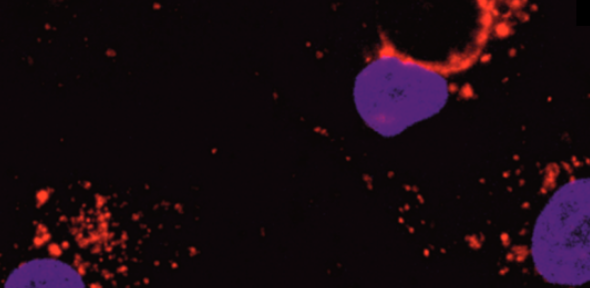
Submitted by Sophie Milbourne on Mon, 24/10/2022 - 00:00
Mesothelioma is a type of cancer predominantly caused by breathing in asbestos fibres. However, the disease usually doesn’t develop for decades after exposure. Once diagnosed, the tumours are already at an advanced stage and current therapies have minimal impact on prolonging the life of patients, so there is an urgent need for new ways to diagnose this cancer earlier and improved treatments.
As mesothelioma commonly starts in the layers of tissue that cover the lungs, a potential new avenue for therapeutics is to learn more about how the mesothelial cells in this layer interact with cancer-associated fibroblasts (CAFs) – a group of cells that support tumour development, spread and resistance to treatment.
New research from our Fibre Toxicity group has revealed that these two groups of cells communicate with each other via extracellular vesicles. Published in the International Journal of Molecular Science, researchers revealed that extracellular vesicles released from the CAFs activated pro-oncogenic aka cancer-promoting signals in healthy mesothelial cells and caused increased growth and motility.
Clearly, extracellular vesicles released by CAFs are significant in the development of mesothelioma and opens new avenues to explore for cancer therapies.
‘Extracellular vesicles isolated from malignant mesothelioma cancer-associated fibroblasts induce pro-oncogenic changes in healthy mesothelial cells’ was published on 18th October 2022 in the International Journal of Molecular Science. Read the full publication here.

